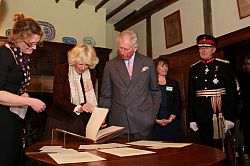University archive’s poignant Kipling letter ‘moves’ Royal visitors
The poignant last letter sent by the poet Rudyard Kipling’s son John to his parents from the Front in France during World War I was one of the University of Sussex archive items viewed by HRH The Prince of Wales and The Duchess of Cornwall when they visited Bateman’s, the writer’s former home in East Sussex, this week.
 Fiona Courage (left) with HRH the Prince of Wales and the Duchess of Cornwall at Bateman's, viewing letters from the Kipling archive. Photo courtesy of the National Trust
Fiona Courage (left) with HRH the Prince of Wales and the Duchess of Cornwall at Bateman's, viewing letters from the Kipling archive. Photo courtesy of the National Trust
Special Collections manager Fiona Courage was invited by the National Trust, who own and manage Bateman’s, to bring a selection of items from the University’s Kipling Papers archive to show the royal visitors during their tour.
The royal couple paused to read a selection of letters sent to Rudyard and Carrie Kipling by their son John from France. John sent his final letter on 25 September 1915, two days before he was reported missing in action at the Battle of Loos.
John wrote: “You have no idea what enormous issues depend on these next few days," and signed off: “Well so long old dears. Dear love. John” The loss of his son inspired Kipling’s poem ‘My Boy Jack’.
Also on display from the University’s archive collection was a book of sketches by Kipling’s father, the artist John Lockwood Kipling, which he drew for Kipling’s children depicting their family life.
Fiona, who showed the Queen around the Special Collections archive at the opening of The Keep, now home to Special Collections, in October 2013, says: “Prince Charles and the Duchess of Cornwall were moved by John’s letters and amused and delighted by the sketch book.”
The letters and other items formed part of an exhibition in 2007 at the Imperial War Museum, London, which told the story of Kipling’s son and World War I.
The personal papers of Rudyard Kipling are held on deposit from the National Trust in the University’s Special Collections. Material ranges from notebooks and sketchbooks to personal correspondence with monarchs and statesmen.
